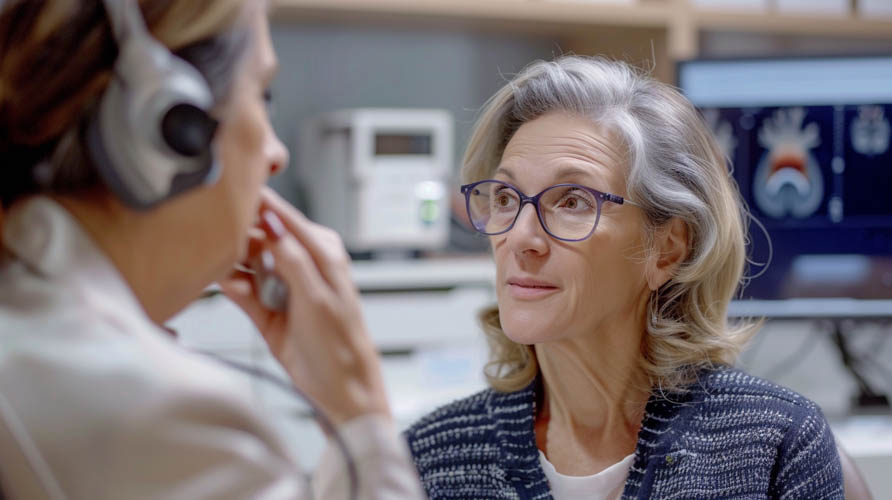You’re not alone if you’re experiencing hearing loss symptoms. Prolonged noise exposure from concerts, workplaces, and loud music damages the inner ear. Medical conditions like otosclerosis, Meniere’s disease, and certain infections can also impact your hearing. Lifestyle choices, such as smoking or poor diet, further harm your auditory system. Certain medications, including some antibiotics and chemotherapy drugs, might contribute to hearing difficulties too. Preventative measures like using ear protection and managing medication side effects are crucial. There’s more to uncover about maintaining and protecting your hearing health.
Noise Exposure
Many adults experiencing hearing loss symptoms can trace the issue back to prolonged noise exposure. Whether it’s from loud concerts, noisy workplaces, or even recreational activities like hunting, constant exposure to high decibel levels can wreak havoc on your hearing. You might not notice it immediately, but over time, the tiny hair cells in your inner ear that help transmit sound to your brain can become damaged or destroyed.
When you’re exposed to loud sounds for extended periods, these hair cells don’t get a chance to recover. Once they’re damaged, there’s no way to repair them, leading to permanent hearing loss. It’s crucial to understand that even everyday activities, like listening to music through earphones at high volume, can contribute to this problem.
To protect your hearing, consider wearing ear protection in noisy environments and keeping the volume at a safe level when using headphones. You should also take regular breaks from loud noise to give your ears a chance to rest. By being mindful of your noise exposure, you can reduce the risk of developing hearing loss and maintain better hearing health as you age.
Medical Conditions
While noise exposure is a significant factor, hearing loss can also result from various medical conditions that affect the auditory system. One common culprit is otosclerosis, a condition where abnormal bone growth in the middle ear prevents sound from travelling efficiently. If you experience gradual hearing loss, it might be worth discussing this with your doctor.
Another condition to be aware of is Meniere’s disease, which causes episodes of vertigo, ringing in the ears (tinnitus), and fluctuating hearing loss. It typically affects one ear and can be quite disruptive to your daily life.
Autoimmune inner ear disease (AIED) is another potential cause. This condition occurs when your immune system mistakenly attacks the inner ear, leading to hearing loss. Symptoms often include a rapid decline in hearing and may require immediate medical intervention.
Infections like meningitis or chronic ear infections can also lead to hearing loss. They can damage the inner ear structures or auditory nerve, affecting your ability to hear.
Lastly, certain medications, known as ototoxic drugs, can harm your hearing. If you are undergoing treatment with these medications, it is crucial to monitor your hearing and consult your healthcare provider if you notice any changes.
Lifestyle Choices
Your lifestyle choices can significantly impact your hearing health. The daily decisions you make might seem trivial, but over time, they can accumulate and lead to hearing loss. For instance, consistently exposing your ears to loud environments without proper protection can cause permanent damage. Think about the concerts you’ve attended or the loud machinery you’ve operated—each instance chips away at your hearing ability.
Moreover, habits like smoking and poor diet can also contribute to hearing loss. Smoking restricts blood flow to the inner ear, making it more susceptible to damage. A diet lacking essential nutrients deprives your auditory system of the support it needs to function optimally.
To evoke a sense of urgency and reflection, consider how these lifestyle choices might affect you:
- Missing out on the joy of hearing your favourite song clearly.
- Struggling to engage in conversations with loved ones.
- Feeling isolated due to difficulty in social settings.
- Enduring the constant, frustrating ring of tinnitus.
It’s crucial to recognise how your everyday actions impact your long-term hearing health. By making mindful choices, you can protect your hearing and continue to enjoy the rich sounds of life.
Medications
Apart from lifestyle choices, certain medications can also contribute to hearing loss. You might be surprised to learn that some drugs, both prescription and over-the-counter, have ototoxic effects, meaning they can damage your inner ear. Common culprits include specific antibiotics like gentamicin, some chemotherapy drugs, and even high doses of aspirin.
If you’re taking medications to manage chronic conditions, it’s crucial to be aware of these potential side effects. For instance, nonsteroidal anti-inflammatory drugs (NSAIDs), commonly used for pain relief, can sometimes lead to temporary hearing loss or tinnitus. Diuretics, prescribed for heart conditions or high blood pressure, can also impact your hearing, especially if used in high doses or over extended periods.
It’s important to communicate with your healthcare provider about any hearing changes you notice. They can help you weigh the benefits and risks of continuing a particular medication. Sometimes, alternatives with fewer ototoxic effects are available. Don’t hesitate to ask questions and seek a second opinion if necessary. Being proactive can help you manage your health more effectively and potentially prevent further hearing damage. Always read medication labels and stay informed about the side effects of the drugs you take.
Preventative Measures
Taking proactive steps to protect your hearing can make a significant difference in preventing hearing loss. By adopting a few smart habits, you can preserve your hearing and maintain your quality of life. Firstly, avoid prolonged exposure to loud noises. Whether it’s concerts, construction sites, or even loud music through headphones, these can all contribute to hearing damage over time.
To evoke emotion and underline the importance, consider these alarming facts:
- Permanent Damage: Once your hearing is damaged, it can’t be fully restored.
- Isolation: Hearing loss can lead to feelings of loneliness and social isolation.
- Communication Struggles: Difficulty in understanding conversations can strain relationships.
- Mental Health: There’s a strong link between hearing loss and conditions like depression and anxiety.
Use ear protection like earplugs or noise-cancelling headphones when you’re in noisy environments. Also, keep the volume at a safe level when using personal audio devices. Regular hearing check-ups are crucial too. Early detection can help manage any potential issues before they become severe. Remember, taking these steps now can save you from a lot of difficulties later. Don’t wait until it’s too late to prioritise your hearing health.



